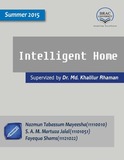Intelligent home
Abstract
As of 2011, the electricity consumption per capita of Bangladesh is 258.62, according to the World Bank[1], whereas the consumption per capita were 228.68 and 251.63 in 2008 and 2009 respectively. Which means that this figure is increasing every year. Which, in turn, means that we are spending a lot of money to pay our electricity bills and soon will be spending a lot more. If we do not take steps to save energy, not only will our electricity bill rise sky high, but the limited resources of nonrenewable energy will also expire before we know it. Almost all of us keep the tap running while brushing our teeth; most of us forget to turn off the lights and fans before leaving our rooms. No one does any of this intentionally, but that is no excuse to waste energy. The home automation system is such a technology that can help us save energy. It has such interfaces so as to automatically turn the lights and fans on or off as we enter or leave a room; turns the tap on only when we need it to, and turns it off when we are done. Our goal is to come up with a home automation system that may also provide some necessary measurements against accidents at home, like smoke or gas detection in the kitchen, so that the stove gives a signal to turn it off, voice control for the television, etc. Our thesis is based on such a system that will make our lives a lot easier while effectively saving both resources and money.

